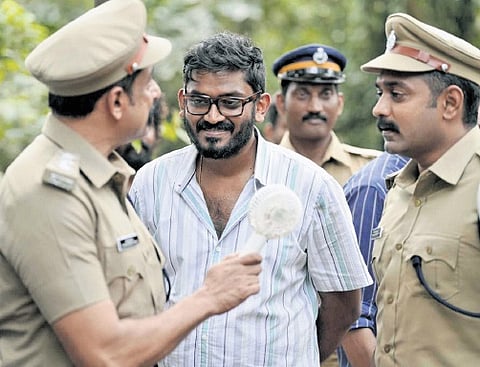

As he gears up for the release of his second film, Jofin T Chacko reflects on the journey that brought Rekhachithram to life. The anticipation is palpable, but he exudes an unflappable calm. “This is an investigative drama that explores alternate history without relying on major twists and turns,” he begins. “The audience will know what transpired as early as the first act.”
According to Jofin, in an industry often dominated by edge-of-the-seat thrillers, Rekhachithram opts for a quieter, more reflective path. The story unfolds across two timelines—the present day and events that occurred forty years ago. “What sets this film apart is its backdrop; it does not rely on heavy suspense or unexpected twists,” Jofin adds.
At its heart is Vivek Gopinath, a suspended police officer played by Asif Ali, tasked with solving a decades-old murder. “Vivek is depicted as an ordinary man in his thirties—neither burdened by depression nor grappling with an identity crisis,” Jofin explains. “Instead, he is a relatable, everyday individual navigating the challenges of life.”
The seeds of Rekhachithram were sown long before Jofin’s directorial debut, The Priest, headlined by Mammootty and Manju Warrier. “From the moment the concept for Rekhachithram emerged—back in 2018, even before my debut film—I envisioned Asif in this role,” he says. “At the time, he had only played one cop role, and that too as a constable.
The character required someone who could deliver a nuanced performance and hadn’t been extensively typecast as a police officer. However, this wasn’t a subject I could pitch as my debut.” Jofin remains hesitant to discuss Anaswara’s character in the upcoming film. He says, “Revealing details about her character would spoil the unique setting of the film, particularly its second hour. While the first half is relatively conventional, the story transitions into a distinctive zone later on in the second hour, driven by the emotional journeys of the characters.”
The journey to bring Rekhachithram to the screen was not without its challenges. The film’s exploration of alternate history necessitated meticulous research and, more importantly, consent from individuals whose lives intersected with the narrative. “Their approval was critical; even one objection could have derailed the project,” Jofin recalls.
“Thankfully, everyone agreed, enabling this film to materialise.” This collaborative spirit extended beyond just permissions. “The climactic portions of the story underwent changes after discussions with one such individual,” Jofin admits. While Jofin’s passion for storytelling is evident, he is pragmatic about the challenges of drawing audiences to theatres in today’s scenario. “While making this film, we didn’t focus on whether viewers might perceive it as slow-paced,” he states. “It is a drama, not a thriller, so we paced it accordingly to ensure audiences could immerse themselves in the characters’ arcs.”
One of the more delicate tasks in the film’s pre-release phase was crafting a trailer that would intrigue without spoiling. “Typically, we assign a separate editor to cut the trailer, but in this case, the responsibility fell to the film’s editor, Shameer Muhammed,” Jofin shares. “Having seen the film in its entirety, he had a clear vision for how to cut the trailer, and the credit for its execution goes entirely to him.”
On cinematographer Appu Prabhakar’s involvement, Jofin reveals that they originally intended to shoot the period portions on film camera. “We wanted someone from this generation who had expertise with film cameras,” he says. “However, due to practical and budgetary constraints, we eventually dropped that idea.”
Looking back on his journey from his debut film, Jofin also reflects on the lessons learned. “As a filmmaker, I’ve tried to learn from the mistakes I made during my first film and improve on them in this second venture,” he says candidly. “That said, I might have made new mistakes, which I hope the audience will point out.”
Unlike the stories of many filmmakers, Jofin’s path to the director’s chair has been relatively smooth. “Unlike those who have faced significant struggles to establish themselves, my journey has been relatively smoother,” he acknowledges. “I started my career with a cinema marketing company, built valuable contacts, and invested the profits into my education in filmmaking.”
He is also quick to credit the support of his producers, Anto Joseph and Venu Kunnappilly, for bringing Rekhachithram to fruition. “I’ve had a long-standing friendship with Anto chettan, one of the co-producers, through whom I was able to pitch my debut film to a star like Mammootty,” says Jofin. “I met Venu sir through this project, and he has been a highly supportive producer, trusting in our vision and providing all the resources we needed.”